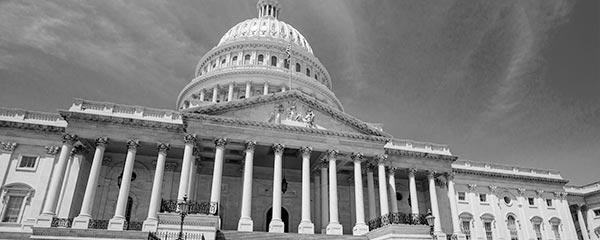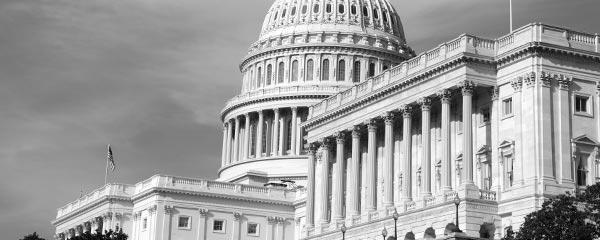Story Highlights
- Trust in legislative branch up 12 points among Democrats
- Trust down 15 points among Republicans
- Judicial branch remains more trusted than executive, legislative branches
WASHINGTON, D.C. -- Democrats are significantly more trusting, and Republicans significantly less trusting, of the legislative branch of the federal government than they were a year ago. The percentage of Democrats who have a great deal or fair amount of trust has increased from 33% to 45%, while Republican trust has shown a bigger change, falling from 48% to 33%.
| 2018 | 2019 | Change | |||||||||||||||||||||||||||||||||||||||||||||||||||||||||||||||||||||||||||||||||||||||||||||||||
|---|---|---|---|---|---|---|---|---|---|---|---|---|---|---|---|---|---|---|---|---|---|---|---|---|---|---|---|---|---|---|---|---|---|---|---|---|---|---|---|---|---|---|---|---|---|---|---|---|---|---|---|---|---|---|---|---|---|---|---|---|---|---|---|---|---|---|---|---|---|---|---|---|---|---|---|---|---|---|---|---|---|---|---|---|---|---|---|---|---|---|---|---|---|---|---|---|---|---|---|
| % | % | pct. pts. | |||||||||||||||||||||||||||||||||||||||||||||||||||||||||||||||||||||||||||||||||||||||||||||||||
| Democrats | 33 | 45 | +12 | ||||||||||||||||||||||||||||||||||||||||||||||||||||||||||||||||||||||||||||||||||||||||||||||||
| Independents | 39 | 36 | -3 | ||||||||||||||||||||||||||||||||||||||||||||||||||||||||||||||||||||||||||||||||||||||||||||||||
| Republicans | 48 | 33 | -15 | ||||||||||||||||||||||||||||||||||||||||||||||||||||||||||||||||||||||||||||||||||||||||||||||||
| ║┌┴¤═° | |||||||||||||||||||||||||||||||||||||||||||||||||||||||||||||||||||||||||||||||||||||||||||||||||||
The changes in trust have occurred since Democrats became the majority party in the House of Representatives after last fall's midterm elections. Republicans remain the majority party in the Senate.
Historically, when one party has control of both houses of Congress, its supporters express more faith in the legislative branch than do supporters of the opposing party. For instance, 65% of Democrats vs. 32% of Republicans had a great deal or fair amount of trust in the legislative branch in 2009 (a 33-percentage-point gap), when Democrats held the presidency and large majorities in both houses of Congress. Conversely, Republicans were more trusting in 1998 by 25 points -- 79% vs. 54% -- when Bill Clinton was impeached.
During periods of divided party control of Congress, as in 2001-2002 and 2011-2014, the partisan trust gap has been smaller. The larger 12-point gap in trust this year suggests that Americans tend to perceive Congress as a Democratic institution, perhaps because of the House's consistent opposition to President Donald Trump's agenda.

The Sept. 3-15 ║┌┴¤═° poll finds no meaningful change over the past year in political independents' trust in the legislative branch (39% in 2018 versus 36% today), nor among Americans overall (40% in 2018 versus 38% today).
Americans' trust in the legislative branch remains on the lower end of the range of what ║┌┴¤═° has measured historically, although it is significantly higher than the historical low of 28% in 2014. Before 2007, consistent majorities of Americans trusted the legislative branch.

Americans Most Trusting of Judicial Branch
Americans are slightly more likely to trust the executive branch (45%) than the legislative branch this year, but they trust the judicial branch the most of the three (69%). The judicial branch has been the top-ranked branch almost every year, while the legislative branch tends to be the lowest rated.

Historically, trust in the judicial branch has been above 60%, with the only exception occurring in 2015, after the Supreme Court legalized same-sex marriage nationwide and turned back a second legal challenge to the Affordable Care Act.
Americans' current trust in the executive branch is slightly higher than the all-time low of 40%, which came during the Watergate investigations in 1974. But it has been in the low 40s multiple times since 2007, including 42% last year, 43% in 2014 and 42% in 2008.
Whereas Democrats have more trust in the legislative branch than Republicans do, the opposite is the case for the executive and judicial branches.
Consistent with the extreme political polarization in presidential approval ratings, 90% of Republicans have a great deal or fair amount of trust in the executive branch, compared with 9% of Democrats. The 81-point party gap is the largest measured to date, but the gap has been consistently above 60 points since 2003.
Eighty-three percent of Republicans and 56% of Democrats trust the judicial branch, with the 27-point party divide tying the high from 2008. There have historically been party differences in trust in the judicial branch, which tend to favor the party of the sitting president.
The current measure is the first reading on trust in the judicial branch since Justice Brett Kavanaugh's confirmation to the Supreme Court. Trust among Republicans is little changed since a year ago, while among Democrats it is down slightly from 61% in 2019.
Implications
At a time when tensions between the legislative and executive branches are high, Americans do not have a great deal of trust in either. Partisans have made their allegiances clear, with Republicans lining up behind Trump and the executive branch, and Democrats trusting the legislative branch significantly more than Republicans do.
The House seems closer to impeaching Trump than at any prior point amid concerns that Trump made U.S. foreign aid to Ukraine contingent on the Ukraine government investigating the family member of a political rival who had business dealings in the country.
Should Trump be impeached, trust in the executive branch could erode further, perhaps below Watergate-era levels. But the depths to which it could sink would depend on whether Republicans continue to show nearly universal support for the president or begin to peel away from him. Impeachment proceedings could also harm trust in the legislative branch, if the public comes to see Congress as unfairly going after the president.
View complete question responses and trends.
Learn more about how the works.




